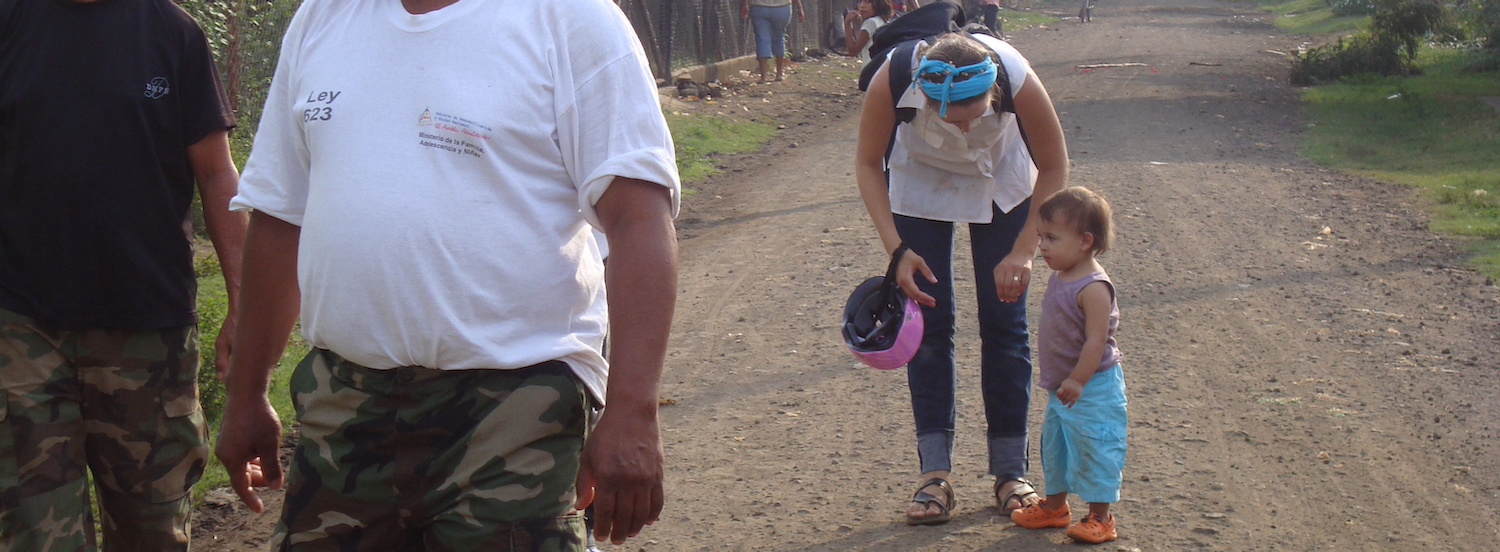Positioning ourselves within global health equity goals and landscapes
by Elysée Nouvet
Assistant Professor, School of Health Studies, Faculty of Health Sciences, enouvet@uwo.ca
Posted 07-21-2021
Twenty years ago, I decided to return to academia after a 2004 visit to Nicaragua, Central America. I was working in documentary film production. I had gotten a small grant to develop a scenario on water privatization. I travelled the country speaking to families and community leaders about unaffordable public water, contaminated well-water from the agricultural industry, and indigenous communal land under threat from a dam project. As I observed casual greetings between neighbours and acquaintances (often in more impoverished neighborhoods or encampments), I was struck by how often the answer to the question “How are things?” would be: “Bad!” (Malo!). Such statements would sometimes lead to vague descriptions of “the situation” (in the country) or specifics: about the buying power of a cordoba (the currency); the theft of a water barrel in the night; too much rain ruining belongings or bringing illnesses; diabetes, back pain, eye problems, toothaches.
I realized later through my PhD research that these quick accounts of accumulated hardship were rarely fully candid. These, too, kept much hidden from view. Still, they revealed to me, a budding medical anthropologist, a very different sociality of suffering than the one I had come to know growing up middle class in Ottawa.
In my home and in the family of many of my peers, the space and time to share psychological or physical pain were quite limited. Those who had a “good attitude” and did not “complain” were praised. That had annoyed me from a young age. I was inspired by people who seemed optimistic about human’s potential for creativity, caring, and collaboration. But looking at the world and its unequal distribution of life challenges, violence, food, water, and with such social determinants health and well-being, it was clear to me that we need critique, alongside celebration, to transform unjust social systems and relations. We need spaces to share, listen, and try to learn from stories of lives that do not feel “good” or even ok to those living them.
Today, I’m one of several faculty, staff, and students here at Western that categorizes their work as work in and for “global health equity”.
“Health equity is created when individuals have the fair opportunity to reach their fullest health potential. Achieving health equity requires reducing unnecessary and avoidable differences that are unfair and unjust.” (PHO, 2021)
Engaging in global health equity education, research, and practice work involves, as the above definition suggests, a commitment to advocacy. This is value-driven and aspirational work, asserting a human obligation to support all humans’ right to attain their potential for health and well-being regardless of their social identity, status, or socially determined living conditions (WHO, 2021). This work is also critical: recognizing in order to achieve lasting social transformation, we need to understand what Paul Farmer named structural violence: the ways in which socially created systems that normalize who has (and who does not have) access to power, resources, and social advantage (re)produce uneven geographies of health and suffering (Farmer, 2010). But challenging socially determined and systemically enshrined relations of inequality, whether in one’s own city or for trans-national concerns, requires more than analysis and an ethical commitment. It also requires energy and imagination. Furthermore, challenging inequality begins with oneself. It involves committing to reflexive practice where one is aware of their own positionality in all interactions and relationships and mitigating inequality where possible.
The beauty of a blog dedicated to the broad topic of global health equity, in my view, is that such a blog can be a space to reflect upon, discuss, debate, but also re-imagine what is possible, normal, necessary to support global health equity. I hope this blog serves as a space to share the events, resources, situations, connections, that have sparked a rethinking about how global health equity can be achieved.
If I had to reduce all I learnt during my PhD to one life lesson, it would be that to remain hopeful about social change, we need to listen to stories. We need to learn and store away for future reference awareness that the strategies and emotions that drive effective collective action to transform inequities vary across societies, causes, but also across individuals (even within the same household). We are all constantly changing as individuals. The challenges to global health equity are also diverse and changing. We need a lot ideas and energy to keep at this work. Growing our archives of global health equity-engaged work grows our repertoire (individual or collective) for future action.
References:
Farmer, P. (2010). Pathologies of power health, human rights, and the new war on the poor. Berkeley, California: University of California Press.
WHO (2021). Social determinants of health. World Health Organization. https://www.who.int/health-topics/social-determinants-of-health#tab=tab_1.
PHO (2021). Health Equity. Public Health Ontario. https://www.publichealthontario.ca/en/health-topics/health-equity.

